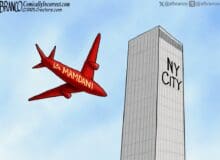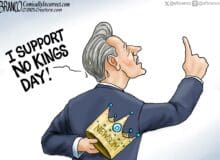(Feb. 13, in anticipation of the weekend of Feb. 22-23) Morning in America first began to thaw the national psyche exactly 40 years ago on back-to-back late February nights. One cold Northeastern town hosted a miracle; another witnessed the moment the country began to straighten its spine.
In retrospect, that 1980 hockey game and a presidential debate produced a stark attitudinal reversal that led the United States (and its allies) on a successful, decadelong push to win the Cold War. Even at the time, the drama of both events felt epic and perhaps epochal. To this day, each event is regarded, in each’s respective field, as a touchstone, a permanent reference point, almost mythic.
The first event will forever be known as the “Miracle on Ice,” the huge upset victory of the U.S. Olympic hockey squad against the supposedly invincible Soviets. Sports Illustrated eventually called it the top sports moment of the entire 20th century.

The second event was the Republican presidential primary debate in Nashua, New Hampshire, where a politically reeling Ronald Reagan famously insisted that he “paid for this microphone” while arguing with the debate moderator. Reagan himself was later to call it the single most important moment of his 12-year quest for the presidency: “I may have won the debate, the primary, and the nomination right there.”
For American power and American prestige, the 1970s were a disaster. A presidential resignation. Ignominious retreat from Vietnam. Not one but two major “energy crises.” Hyperinflation for most of the decade, combined (eventually) with exorbitant interest rates and higher-than-acceptable unemployment. Increasing incidence of homelessness and rapidly rising crime rates. A president who made a national speech declaring an American “crisis of confidence” that “strikes at the very heart and soul and spirit of our national will.” Mind you, this speech of Jimmy Carter’s came even before Iranian “students” began holding 52 Americans hostage as our government failed with feckless diplomatic efforts to free them.
Most of all, there was the seemingly unstoppable Soviet hegemon, successfully sponsoring communist takeovers in Asia, Africa, the Caribbean, and Latin America. As Nicaragua turned communist in 1979 and El Salvador was threatened by Soviet-backed guerrillas, real fears grew the “revolution” would spread into Mexico and toward our borders while the Caribbean might become what Reagan called a “communist lake.” The Soviets had more nuclear warheads than the U.S., and the gap was growing.
Then, the Soviets invaded Afghanistan, in what originally seemed like yet another successful communist takeover, and a hapless Carter futilely imposed a grain embargo while lamenting he learned more about Soviet intentions in the past few months than he had ever known before.
On almost all fronts, the U.S. seemed like a declining power, a teetering giant….
[This story keeps going for quite a while, but I promise it’s worth it. And it has details you probably have never heard before. The full piece is at this link.]






